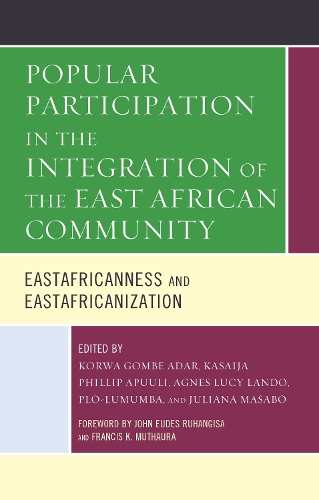
Popular Participation in the Integration of the East African Community: Eastafricanness and Eastafricanization
(Hardback)
Publishing Details
Popular Participation in the Integration of the East African Community: Eastafricanness and Eastafricanization
By (Author) Korwa Gombe Adar
Edited by Kasaija Phillip Apuuli
Edited by Agnes Lucy Lando
Edited by PLO-Lumumba
Edited by Juliana Masabo
Foreword by John Eudes Ruhangisa
Foreword by Francis K. Muthaura
Contributions by Korwa Gombe Adar
Contributions by Kasaija Phillip Apuuli
Contributions by Agnes Lucy Lando
Bloomsbury Publishing PLC
Lexington Books
9th March 2020
United States
Classifications
Professional and Scholarly
Non Fiction
African history
337.676
Physical Properties
Hardback
402
Width 158mm, Height 230mm, Spine 35mm
758g
Description
The post-independence integration endeavor of the East African Community has been punctuated with challenges, culminating into the collapse of the 1967-1977 regional organization. The renaissance of the integration agenda since the re-establishment of the regional organization in 1999 has rekindled epistemological debate among scholars and practitioners on the East African Community raison d'etre and integration process. This volume is the first of its kind in this ongoing debate that puts into proper context the nexus between the East African citizens and the integration agenda. Focusing on the Partner States case studies, the authors of the chapters operationalize the concepts of popular participation, eastafricanness, eastafricanization, democratization, and integration. Using political, national constitutions and EAC treaty, communication and awareness dimensions the authors of the chapters have analyzed the nexus between the EACcitizens and the integration process. The study generally proceeds from the premise that the exclusion of the EAC citizens from exercising their sovereign rights through popular participation undermines the prospects for the institutionalization and consolidation of the EAC identity, eastafricanness, eastafricanization, democratization and integration.
Reviews
This book is a truly special contribution to the epistemological interrogation of the impact of integration on the citizenship. Critically, the book analyses the genesis, manifestation and the historical process of eastafricanization from the prism of the citizen and within the doctrine of popular sovereignty. The uniqueness of this book is to give the student, the policy maker, governments and the citizen, a birds eye view of mapping out the future possibilities of the East African Community. -- Isaac Tarus, Egerton University
This is an important and essential book in the era of regional integration studies in international studies. The book is a master piece for everyone interested in the new concepts of Eastafricanness and the process of Eastafricanisation. This important text is a timely addition to International Relations, Foreign Policy and African International Studies courses, as well as a tool for policy makers, diplomats and NGO community. -- Dorothy Akoth Nyakwaka, Egerton University
Author Bio
Korwa Gombe Adar is professor of international studies at the University of Botswana.
Kasaija Phillip Apuuli is associate professor in the Department of Political Science and Public Administration, Makerere University.
Agnes Lucy Lando is associate professor of communication and media studies at Daystar University.
PLO-Lumumba is associate professor of public law at Kabarak University.
Juliana Masabo is a judge of the High Court of Tanzania. She was formerly senior lecturer in the School of Law at the University of Dar es Salaam.
